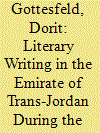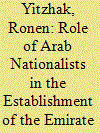| Srl | Item |
| 1 |
ID:
188649


|
|
|
|
|
| Summary/Abstract |
This article deals with the literature that flourished in Jordan during the reign of King Abdullah I. It shows that although Abdullah wanted his views and the values of his regime to prevail over literary writing, behind the scenes, an opposition literature grew that undermined these values. Oppositional messages were disguised using various artistic means and many works were published outside rather than inside Jordan. In the end, however, it seems that the regime still managed to impose its values, since up to the present, literary research has tended to ignore the works written during this early period, showing that writing in Trans-Jordan was not oppositional. This article fills this void by pointing to the buds of subversion as reflected in literature written at that time.
|
|
|
|
|
|
|
|
|
|
|
|
|
|
|
|
| 2 |
ID:
188644


|
|
|
|
|
| Summary/Abstract |
The article discusses the relations between Arab nationalists and Amīr Abdullah in the Emirate of Trans-Jordan in the crucial period from 1921–1924. The first connections between the two arose due to the desire of the Arab nationalists to realize their ambition of throwing the French out of Syria and establishing an Arab government there instead. The nationalists thought that they would be able to achieve their goals through Abdullah, who had come to Trans-Jordan from Hejāz. Thus, they supported, encouraged, and gave him political backing in Trans-Jordan. The backing that he received from the nationalists was one of the considerations that the British government took into account in deciding whether or not to give him power in 1921. For his part, Abdullah encouraged the Arab nationalists by giving them political positions and integrating them into the Reserve Force (the military force established by the British), and by ignoring their activities directed against the French in Syria. The co-option of pan-Arab nationalists into Trans-Jordanian politics confirms that Abdullah did not want to develop local nationalism in Trans-Jordan in the first years of his rule. Nevertheless, as the rift between Abdullah and the British grew wider due to Arab nationalist activity, this led the Amīr to have concerns for his political future and drove him to tighten his ties with London and abandon those he had with the nationalists. Abdullah made his final decision in 1924, when he severed ties with the Arab nationalists and expelled their leaders from Trans-Jordan. From that time forward, Abdullah linked his political fate to Britain, which became the political and military mainstay of the Hashemite family in Trans-Jordan (and later in Jordan).
|
|
|
|
|
|
|
|
|
|
|
|
|
|
|
|